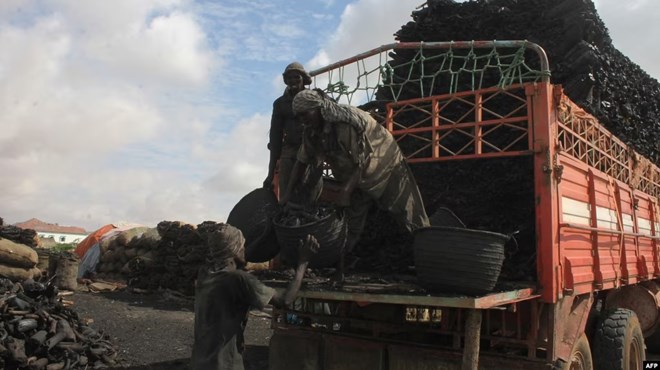
Friday August 16, 2024
By Harun Maruf

FILE - Laborers load a truck with charcoal in an open market in the Yakhshid district of Mogadishu on Oct. 26, 2014.
He works like the ultimate altruist, splitting his time between collecting garbage, planting trees and delivering water, but he was not always so charitable to the environment and the well-being of his community.
Ali Mohamed Ali says he prays to God regularly to beg forgiveness for his past actions — specifically, cutting trees and burning wood for charcoal to profit.
“I used to take the lives of 50 acacia trees per day,” said Ali, a resident and a former charcoal businessman in the small town of Dhahar in northern Somalia.
He was not just chopping down big trees. He used to cut dozens of young trees and use the shrubs to heat his charcoal pit.
“I regret it very much,” Ali said. “It is a dark experience that haunts me.”
Ali, 55, a former soldier, returned to his hometown in 1991 following the start of the Somali civil war. Three years later, he started cutting trees and superheating the wood to make charcoal, a primary source of energy for millions in Somalia and nations of the Arabian Peninsula.
Tree cutting for charcoal is also a primary cause of deforestation in Somalia, where the U.N.’s Food and Agricultural Organization says tree cover dropped by nearly 30% between 1990 and 2020, contributing to the climate and environmental crisis affecting much of East Africa.
Initially, Ali worked by himself. But after companies showed interest, he set up his own charcoal business.
“I was selling it to contractors that used to export it to the United Arab Emirates,” he said. “Sometimes I myself would also export about 2,000 bags.”
Ali continued the business until 2008 when he stopped as a result of pressure from the community and the administration in Somalia’s Puntland region, both worried about the increasing pace of deforestation.
In 2012, the U.N. Security Council issued a resolution banning the export of charcoal from Somali in a bid to save the country’s decreasing tree cover.
Ali understood the concern but saw tree-cutting through an economic prism.
“I was only looking for a living,” he said. “I was very sad when it was stopped. I viewed it as a job-creating opportunity.”
After the charcoal business stopped, he opened a lodge that failed. He eventually launched a water delivery business, using wheelbarrows to tote bottles to the community. He saved money to buy a water truck, and later bought a second.
He also started planting trees in the town and has now set up his own nursery.
“I now planted most of the trees in the town,” he said. “In the future I want to plant trees alongside an 800-meter road.”
In addition, Ali received a municipal contract to collect garbage from the city. He separates plastic and metal items that can be recycled and burns the rest.
Aware that burning contributes to pollution, he said the alternative would be to bury the garbage as landfill. Authorities, he said, will have to make that decision.
Earlier this year, the regional ministry of environment in Puntland awarded him with a certificate of recognition for his environmental work.
In 2022, Somalia’s government created the Ministry of Environment and Climate Change to elevate its focus on climate change.
“The ministry is busy with alternative energy,” said Dr. Badal Ahmed Hassan, a senior ministry adviser. “The best alternative energy is cooking gas, but the price of gas is not something Somali people can afford.”
He called Somali’s loss of forested land a “tragedy of the commons.”
“Somalia’s safety net is the tree — people rely on it for fruits, sap, wood and charcoal,” he said. “If one loses the livestock, [people] turn to the tree to burn charcoal and make a living. There was no government to manage these challenges.”
In October 2022, President Hassan Sheikh Mohamud announced a “Somalia Green Initiative” that aimed to plant 10 million trees nationwide. Officials admit they are way behind schedule with two years of Mohamud’s term remaining.
Hassan said about 50,000 trees were planted in the Mogadishu area.
“We created an ecosystem restoration coalition network, and we are working on a platform that allows people to tell us how many trees they have planted,” he said. “That platform is under construction.”